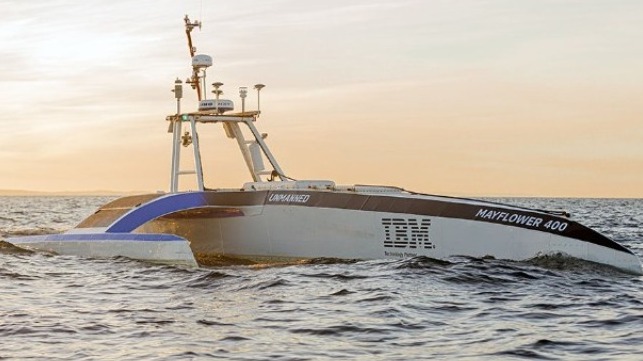
Marine research organization ProMare, which organized the aborted effort to make an unmanned Atlantic crossing with the Mayflower Autonomous Ship (MAS400) released the first details of the voyage and the fault that caused them to scrub the mission after just three days. They said that repairs were ongoing on the vessel and that testing would soon begin before they scheduled a new attempt at the crewless research voyage.
The Mayflower departed the UK on June 15, and during its three days of operations, the vessel cruised at an average speed of seven knots covering a distance of 450 nautical miles in a west-southwest direction. During this time the ship performed well and demonstrated its ability to handle ocean conditions according to ProMare.
The IBM-sponsored autonomous vessel prototype however developed a “glitch with the ship’s hybrid propulsion system” that resulted in a loss of full power and speed. Following a remote assessment, ProMare’s support team determined that it was likely due to a mechanical issue with the ship’s generator that was not possible to repair without human intervention. A command was issued to the vessel’s systems to turn around and head back to the UK.
The vessel was able to travel for an additional 30 hours before its speed was reduced to around three knots. The MAS400 then automatically went into a mode to conserve enough power for its communication and video systems. A support boat reached the unmanned vessel on June 19 and attached a tow line to begin the recovery process.
Once back at base, ProMare said that it determined that the issue had been caused by a fracture in the flexible metal coupling between the ship’s generator and exhaust system. MAS400 uses solar panels to draw energy from the sun. An onboard generator switches on automatically to top up the battery when required. Following the fracturing of the coupling, MAS400 had to rely solely on solar power, but the bad weather and rough seas at the time meant that MAS400 did not generate enough solar power to continue its journey.
MAS400 is currently in dry dock in Turnchapel Wharf, Plymouth, UK undergoing a thorough inspection and repair. The generator has been removed and a replacement ordered. ProMare is performing a redesign of the coupling and is also taking the opportunity to upgrade some of the edge computing devices to increase the onboard processing power.
“Despite the setback, we’ve learned a lot and we’re more encouraged than ever that the Mayflower will safely navigate the world’s oceans in the near future,” said Brett Phaneuf, Director of the Mayflower Autonomous Ship Project.
The team highlighted the results of the first voyage saying that they were able to successfully monitor the operation of Mayflower and the supporting software. Based on IBM Automation software, the AI Captain demonstrated its ability to correctly assess the current environment, identify and avoid hazards and maintain situational awareness using the ship’s edge computing capabilities. Significantly, the distributed nature of the software allowed hotfix updates to address the shifting needs of the control software during the recovery effort.
The ship’s science experiments and live streaming of video and data from the ship also performed well for the time they were operational. The MAS400.com web portal displayed live video and data to over 40 thousand followers during the days of the Atlantic crossing attempt.
ProMare said it aims to have MAS400 back in the water in the next few weeks. Following tests and long-range trials, the team will make a decision about the ship’s next missions and the timing of next Atlantic crossing attempt.
SOURCE READ THE FULL ARTICLE
https://www.maritime-executive.com/article/mayflower-autonomous-vessel-s-problems-diagnosed-and-repaired